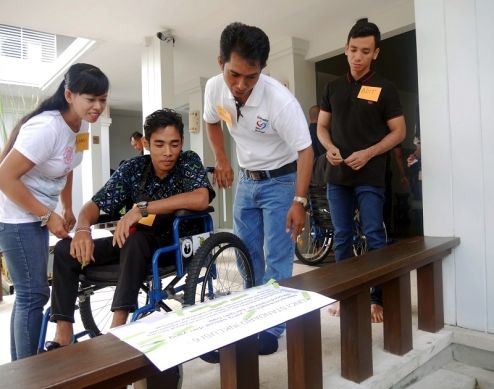Humanitarian action that leaves no one behind: Sphere trainers in Asia promote awareness about disability inclusiveness in disaster response.

Photo credit: Axel Schmidt, ASB
With more than 15 percent of the global population living with a disability, Sphere has been working with partners and trainers to make sure that humanitarian assistance is more inclusive and accessible to all. Sphere Focal Points and trainers in Asia have been leading the way, with workshops in Bangladesh and Indonesia over the past several months to help humanitarian workers provide appropriate assistance to some of the most vulnerable members of society.
In Bangladesh, Sphere trainers Axel Schmidt of Arbeiter-Samariter-Bund (ASB) and Nayeem Wahra of the Sphere Bangladesh Community (SCB) co-facilitated a Sphere workshop with a special focus on the inclusion of persons with disability. Hosted by the Center for Disability in Development (CDD) in Cox’s Bazar at the end of 2017, the trainings were organized so to be accessible to any humanitarian practitioner, regardless of their physical ability. Following the workshop, the organizers conducted a brief assessment in the nearby Balukhali II refugee camp, where some 84,000 Rohingyas are stuck with limited access to basic services.
In Indonesia, Axel Schmidt and Iskander Leman from the Indonesian Society for Disaster Management (MBPI), the local Sphere Focal Point, held a Sphere and Age & Disability Inclusion training early this year in Bali. People in wheelchairs could easily access the training; content was instantaneously translated from Bahasa Indonesia into sign language to involve deaf participants. During the training, people of different abilities took part in role plays which allowed them to identify those barriers that prevent some parts of the affected population to receive appropriate aid.
“Similar trainings were successfully conducted in the aftermath of the 2015 Nepal earthquake, of the 2016 Hurricane Matthew in Haiti, and of the Marawi response in Philippines in 2017”, says Christine Knudsen, Sphere Executive Director. “They all proved to be good inspiration to push for a more integrated and inclusive approach. These training opportunities are much needed to ensure we leave no one behind in humanitarian action”.
As Sphere trainers across the globe develop inclusive workshops, the humanitarian community is taking further steps to ensure disability concerns are considered when delivering aid and assistance. Led by HelpAge International, the Age and Disability Capacity Programme (ADCAP) recently released a new handbook, “Humanitarian inclusion standards for older people and people with disabilities”. The publication features standards and guidelines tailored to the special needs of the two groups, to be carefully included in planning and organizing the emergency response. This is a crucial step forward to ensure that humanitarian response truly supports dignity and rights for all, on an impartial basis.
